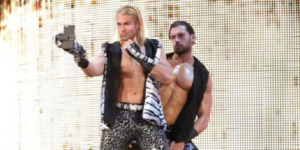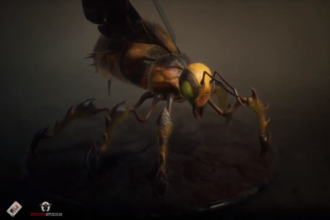Breezango and Playing Comic NPCs Correctly
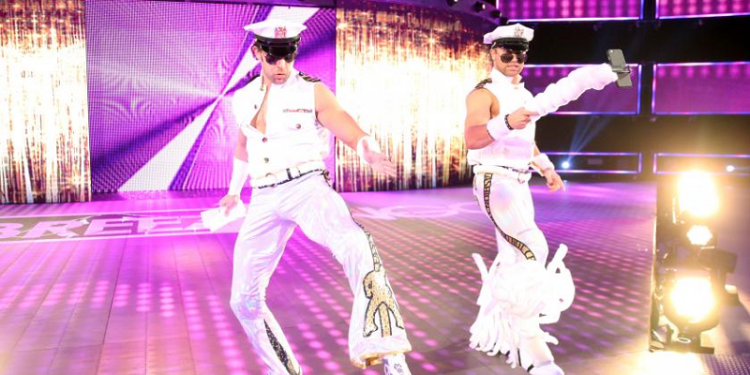
Zoolander is one of my favorite films. It’s endlessly quotable, and the character presentations do a fantastic job of illustrating the dichotomy between the perceptions of those inside the fashion industry and those outside of it. If you told me you were crossing Zoolander with Law & Order and giving it as a gimmick to some professional wrestlers, I would tell you it is a concept worthy of eye rolls and would result in people tuning out. Enter the tag team of Fandango and Tyler Breeze – henceforth known as Breezango. Not only does the team lean hard into the idea they are ridiculously good looking, they also completely try and sell the idea they are real police officers looking to bring justice to all of those committing fashion crimes. This is played up in some of the skits that are performed each week on Smackdown, and in the ring itself. The ring entrance is something of a “stripper cops” vibe – which tests well with certain demographics, I am sure. This sounds like a stupid set up for one of the destined-to-fail WWE comedy teams. The skits are funny and entertaining, but it’s the work in the ring that matters. This past weekend was the Smackdown Live Pay-Per-View event Backlash. We got to see the Fashion Police in full on gimmick mode against the Usos. Excuse my language here, but it was fucking awesome. The match was certainly a comedy match, but the action was incredible. Watching the bout, I was reminded of one of the most important things in running comedic NPCs in tabletop games: having silly or goofy NPCs is fine, but only if you portray them the right way.
Before getting into the reason why Breezango worked so well, we need to look at the long tradition of wrestling comedy acts. Wrestling has a lot in common with circus performances. The comedy acts in a circus serve two main purposes: easing the audience into the show, and breaking the tension provided by the feats being performed. Mixing the two is often not as effective as having two separate acts. After all, seeing a clown perform trapeze work is novel, but odds are the clown is either better at the trapeze than clowning, or better at clowning than the trapeze. Either way, you are left slightly dissatisfied with the performance. It’s like eating novelty food from KFC. Sure, a chicken sandwich where the buns are fried chicken sounds great, but it ends up being…passable, but not something you want to really eat ever again. For some people, they obviously do, but it’s not for most people. The same is true of a lot of the WWE comedy acts. There is a long list of failed attempts at humor that just don’t cut the mustard, and still cause people to cringe whenever comedy acts rear their heads.
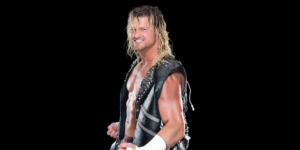
Historically Hilarious
Since Dolph Ziggler had the first main card fight of the night last night (Why was this match the first match? Who does their bookings? I can schedule matches in my free time if you need help, WWE) let’s start with the Spirit Squad. The Spirit Squad was a tag-team stable of male cheerleaders, including a young Mr. Zigglesworth. They literally started off as cheerleaders for a different match, and then held the tag team titles for 214 days as they feuded with D-X and Shawn Michaels. I guess the model here was rehashing preppies vs. the disaffected cool kids? It’s amazing they stayed in the spotlight as long as they did, but it was not a popular gimmick, nor really a successful one – despite the title run. If that one doesn’t do it for you, how about Phantasio – the wrestling mime? He didn’t have theme music, he had a mask with identical face paint underneath it, and won by pantomiming the removal of his opponent’s boxers. He got only a single match on TV. Maybe the Goon is more your speed – Jericho’s rumored gimmick he passed up – a hockey brute that beats up people while wearing full hockey pads and foamed up skates. Sometimes, these comedy gimmicks end up being all a wrestler is remembered for – because it’s often an ultimatum these guys receive.
Such is the sad tale of Gillberg. These days, people might not even really remember the WCW – World Championship Wrestling – but back in the 90’s, there was stiff competition between the WWE(WWF) and the WCW. In the late 90’s into the early 2000’s there was a guy by the name of Bill Goldberg becoming a mega-star in the WCW. You might have heard of him. He was on a huge undefeated streak, and he was taking off like only a few wrestlers before him ever had. At the same time, there was a wrestler named Duane Gill who was wrestling in the WWE. He was mostly a “jobber” – a wrestler who’s job it was to lose to the bigger stars – but managed to pick up the Light Heavyweight Title soon after with the company. This was quickly forgotten as he was given the new gimmick of “Gillberg,” a straight out parody of Bill Goldberg. The entire point of the character was to take the things Goldberg was doing and just make fun of it by doing the opposite. Goldberg had a giant win-streak? Gillberg would have a giant losing streak. There would be sparklers instead of big fireworks. He would say “Who’s first?” instead of “Who’s next?” – he never won, you see. He had a tattoo making fun of Goldberg’s tattoo. The funniest part about all of this – to me – is the fact he was still Light Heavyweight Champion through this and it was like the company forgot it had that belt – which has since been dropped, so maybe they did. Here, you can see he’s purely a comedy act and forgot about the wrestling part all together. His only purpose was to make fun of someone else, and then lose to play that up. Gillberg is still trotted out every now and then, and it’s still just to poke fun at Goldberg.
While Gillberg was a very successful comedy act within the WWE, it’s not as if you could really call him a successful wrestling comedic act. He was a comedy act that would come out to wrestle to get buried as part of the comedy. The Spirit Squad was filled with great wrestlers who were decidedly lacking the comedy department. I remember watching Phantasio live and being ultra confused and definitely not laughing. For the Goon, there was neither comedy nor good wrestling. It’s not easy to blend two things and have the result be as good at both things as the two separate things. That said, there are absolutely cases where it has worked like gangbusters – Doink the Clown defenders, stand proud. Backlash firmly solidified the case for Breezango as a comedic act that is also a great wrestling team. This is thanks to the following:
- Clear concepts
- World congruity
- Thematic support
Clear and Present Laughter
It sounds stupid, but the concept for the fashion police gimmick is incredibly well thought out. It takes the individual character angles each of them had – Fandango as a good-looking, sultry, dancing ladies man, and Tyler Breeze as a narcissistic model – and built from that base into something else. The leap to them focusing on making others as good looking as possible is a small one, turning them from self-centered professionally attractive people into altruistic professionally attractive people. In order to help others, they had to stop others from committing fashion crimes. From there, it’s a small step into making it more like traditional police work in order to illustrate the absurdity of the concept. The presentation is thus: good-looking idiots who think the phrase “fashion crimes” means real crime, and perform “real police work” to get to the bottom of it. I am not trying to convince you this is high-brow comedy – just the opposite, in fact. This is a silly concept that is extremely easy to digest, and doesn’t get in the way of itself with a lot of complexity.
Comedy comes from a place of understanding. Even before the issues of timing and expectations, it’s about understanding. If you can’t understand the source, the method, or the content, it’s just not going to be funny. While nuanced comedy is completely fine, it takes a certain amount of audience sophistication in order to ensure it is grasped. A good example of this the reaction to Scott Pilgrim vs. The World. For me, I understand the source, method, and content and I am completely onboard. However, this is an extremely polarizing film. Some people don’t understand the source, or they aren’t familiar with the method the story is being told, or the content is just something they can’t identify with. In many ways, this is an extremely personal film that still manages to interact with culturally familiar touchstones. That sort of thing easily causes a disconnect. While I love it, I have friends who are either just indifferent or despise it. Likewise, NPCs who are complex and nuanced can be rich experiences for the player. It’s also a much larger risk. If the players don’t understand what is being portrayed, how it is being portrayed, or who is portraying it, it’s not going to resonate. Breezango isn’t a deep concept, but it works because it is extremely clear what it is trying to accomplish. Your NPCs can be much deeper, but they shouldn’t be any less clear.
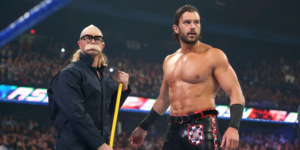
What a World
Of course, none of this matters if the NPC doesn’t seem at home in the world. The humor has to exist within the confines of the world to really be a success. Wrestling is an inherently strange world. Everyone is super human. Sometimes people are the walking undead. Other times there are people claiming to be the best of all time and deserve the respect of everyone forever – despite losing matches about half the time. We are expected to believe there is some sort of contender ranking system and set contract methodology despite nothing ever working out that way – why didn’t Finn Balor get a match after having to vacate the title? Why didn’t KO get a rematch with Goldberg prior to Wrestlemania? In a world where we are expected to believe Bron Strowman doesn’t actually cripple people he wrestles, is it so weird that two people would take themselves seriously as the Fashion Police? I would strongly suggest the answer to that last question is a resounding “no.” Absurdity is the norm to the point where someone’s who is a normal person is seen as incredibly boring. Being “just a dude” isn’t enough when expectations lean towards the bombastic.
While I certainly don’t know your life, I would wager with some level of surety that most D&D campaigns do not take place either in or adjacent to the Plane of Bombast. Instead, most campaigns have a set of guiding world laws and a baseline that gets established for player expectations. Macho Man Randy Savage wouldn’t be at home as a traveling companion for Raistlin Majere. However, Tasslehoff is at home in just such a role. Tasslehoff’s naiveté and willingness to participate in just about any endeavor juxtaposes nicely against Raistlin’s conniving and constantly plotting nature. This is a source of comedy – and tragedy – that is believable in the world, and conforms to the expectations the world has set forth. Mort is a perfect companion to the Nameless One, and his humor plays against the unerring bleakness of the situations and story that are presented. The humor works because it cares about the world and interacts with it respectfully.
Throwing random stuff out there is fine if that’s what your world is about, but the Kool-Aid man crashing through a jail in order to let your protagonists escape isn’t going to play well with most settings and groups. Even though I don’t like the show, Family Guy is an excellent example of where an occurrence would be accepted and commonplace. Hell, it would probably be played off with Kool-Aid telling Brian the Dog, “I owed you one, for what you did for me back in ‘Nam” – complete with an elaborate handshake or salutes. It’s about understanding the rules of the world and playing firmly within them. This allows the context to resonate more strongly that it would otherwise.
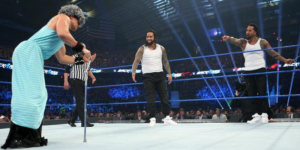
Sweet Support
The final point is the one I consider the most important. Concepts need support to work. This is precisely what we saw in full swing at Backlash. During the skit that preceded the match between Breezango and the Usos, Fandango was in full cop uniform lamenting about how hard it was on these mean streets. Suddenly. someone in a bad janitor costume comes in. After a few moments, it is revealed this is – of course – Tyler Breeze. He’s a hard-boiled undercover fashion cop – natch. When the match begins, Breezes shows up ringside in the same outfit, complete with mop. Fandango is in the ring first, and had great exchanges with his opponent before the tide turning and Fandango needing to tag in his partner. Tyler gets into the ring with the mop and has a stare down before the mop-action starts. This sounds silly, but it was actually great. The segment was just a straight lift of Jackie Chan-style action films. Breeze dodges seemingly by accident, but then uses the mop as a great prop to stop the action, redefine it, and use it as an excellent storytelling device within the confines of the ring. After the mop is broken, Breeze manages to tag back out and quick changes into another disguise – a little old woman with a cane. He plays it up magnificently, and we are treated to an action scenes that morphs from comedy into high-octane physical altercations marked by a dude performing a bronco buster – the crotch to the face in the turnbuckle – in a granny dress. Sure, it was a comedic setup, but the match exhibited some damn fine wrestling.
It’s not enough that the gimmick is funny. In order to support the idea they are police officers, the action has to show they are able to “fight crime.” In this case, it means they have to be able to perform and wrestle at a high level. They wouldn’t be very good police officers if they didn’t have the ability to confront and apprehend the perpetrators, after all. The concept – while obviously a silly conceit – has the weight of core competency behind it. An innate, bumbling guard that is always getting promoted can be hilarious, but only if it is serving some sort of larger thematic purpose. Is the administration just so inept as to not realize how bad the person is? Are the heroes the ones giving this guy credit for their actions as to have someone they can trust won’t be smart enough to give them trouble? In the case of the Banana Guards in Adventure Time, their ineptitude is commentary on both the Candy Kingdom and the importance of Finn. It helps illustrate the danger the kingdom faces while doing so in a comical manner. Their idiocy is thematically supported by the actual thrust of the show. The basic concept being portrayed has to have thematic weight behind it, or it just doesn’t carry the impact that it should.
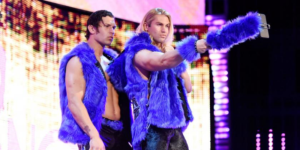
Being Funny is Hard
Comedy gets a bad rap. It never performs well at the Academy Awards. Comedies are somehow seen as “lesser” than their dramatic brethren. For some reason, people believe that comedy is easier than creating a serious or dramatic piece. This couldn’t be further from the truth. Good comedy is one of the hardest things to execute. That’s why so many pieces of comedy fall flat. The reverse would be true if comedy were easy, wouldn’t it? Taking comedy and blending it with other genres is an incredibly challenging task. This is precisely why it has to be approached with care and purpose. For every Grosse Pointe Blank we get, we have ten times as many One for the Moneys. For every Tasslehoff, we get a smorgasbord of writers trying to recreate Tasslehoff in their forgotten Dragonlance works. For every Breezango, we get thrice as many Spirit Squads. This is an exceptionally hard medium to work in, and it is an area that demands respect.
Running successful comedic NPCs in a campaign is no less difficult than the other mediums mentioned above. It requires careful consideration, and exceptional execution in order to come across with the expected intent and message. Luckily, we have examples such as Breezango to lend us a hand in just such a creation.

